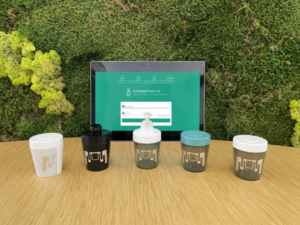Packaging Innovation
The beauty, cosmetics and personal care industry is an innovative, dynamic and sustainable sector and is currently very much focused on improving the sustainability of its processes and products.
This approach has been extended to its product packaging, and the sector is particularly interested in finding more sustainable packaging materials.As indicated by some market studies, plastic continues to be the most widely used material in cosmetics packaging. It is used in different formats as primary packaging, in flexible formats as secondary packaging and in lids and various types of closure (source: Mordor Intelligence).
Furthermore, according to data from recent studies by Ceresana, the market volume of plastic packaging for cosmetics and personal care products is expected to reach 28.9 billion units by 2026.
Given that the concept of sustainability continues to gain prominence in companies’ business models and is also increasingly valued by consumers, a current trend in the sector is the use of alternatives to traditional plastic materials, such as biopolymers, recycled materials and biodegradable or compostable materials. Other packaging solutions such as refillable or rechargeable packaging are also a reality in the current market and will help reduce the consumption of raw materials and the generation of packaging waste.
However, in general, current packaging is not designed to be integrated into an automated 4.0 value chain focused on the circular economy from the brand’s factory and warehouse to use and reuse by consumers so that the natural resources used to manufacture the packaging are reused over and over again in an efficient and traceable way. In this context, digitalization is key to driving sustainability, with new technologies that favour the transition towards digitalization and improvements in resource efficiency.
The ECOSMARTPACK 4.0 Cosmetics Supply Chain project offers the sector an innovative reusable packaging solution based on digital technology through the integration of smart devices designed for identification and traceability of packaging throughout the distribution and logistics chain and for interacting with consumers during its many life cycles. The development is supported by innovative technologies, such as printed or flexible electronics for the development of an RFID antenna to identify and trace packaging and in-mould electronics that make it possible to integrate intelligent sensors into the body of packaging during the manufacturing process. In addition, the project included the design and execution of software modules for a digital platform for the traceability of reusable, uniquely identified packaging throughout its lifetime.
Other aspects of interest were directly related to ecodesign, such as the use of more sustainable materials for packaging manufacture, including recycled materials, the integration of smart elements into the body of the packaging, and media compatibility for printing RFID antennas with packaging material for complete integration of both elements (antenna and packaging), without the need for adhesives or additional materials, thereby ensuring that they are inseparable for several life cycles.
This innovation was possible thanks to the complementary approach and technical capabilities of the entities that form part of the consortium: the technological startup Szentia, the Plastics Technology Centre (AIMPLAS), the SMEs TECTRON and VICEDO MARTI, and the innovative business association Feeling Innovation by Stanpa.
The result of this collaboration is a functional smart packaging prototype that will favour the transition from single-use packaging to reusable packaging for cosmetics, personal care, hygiene and pharmaceutical products that can be traced and will connect the factory, logistics and consumers. ECOSMARTPACK 4.0 therefore represents a clear example of how digital technologies can be applied to control the logistics and distribution of products, thus improving the supply and management of resources.

The project, which finished in 2022, was financed by the Ministry of Industry, Trade and Tourism as part of the support programme for innovative business groups to improve the competitiveness of small and medium-sized businesses in 2021 (within the framework of the Recovery, Transformation and Resilience Plan, file number AE1-010500-2021b-146).
